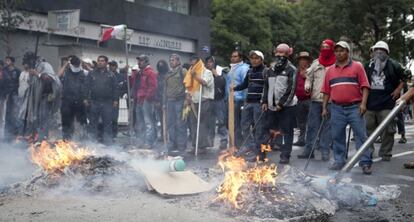Rebel states boycott Mexico’s education reform
New study finds nearly 2,000 ghost schools that are receiving public funding Some teachers are earning more than President Enrique Peña Nieto


Resistance to Mexican President Enrique Peña Nieto’s education reform remains strong. After sustained opposition throughout 2013 from teachers affiliated with the southern teachers’ union Coordinadora Nacional de Trabajadores de la Educación (CNTE), it is now the states themselves that are boycotting the adaptation of national legislation to their own local laws.
Last month, Peña Nieto, of the Institutional Revolutionary Party (PRI), filed six appeals with the Supreme Court of Justice in what amounts to a trial against the governors and local councils of the states of Oaxaca, Chiapas, Michoacán, Sonora, Zacatecas and Baja California. The president claims that the latter have deliberately passed some laws, or failed to pass others, in a bid to prevent parts of his education reform from being implemented on their territory.
The reform’s most controversial aspects deal with teachers’ wages and a constant evaluation system to ensure appointees remained qualified for the job. In the case of Oaxaca, for instance, the government has found that state authorities have made no attempt to adapt their own legislation to the new federal laws.
The Supreme Court now has six months to rule on this issue, although several upcoming events could speed up that decision.
“July is when the evaluation of aspiring new teachers takes place, and even if local laws are not adapted in time, it is not the same thing to go through this process with a Supreme Court ruling or without it,” notes David Calderón, director general of Mexicanos Primero, a grassroots movement for quality education in Mexico.
This reform creates mistrust in a profession that sees its tenure endangered”
Peña Nieto’s education reform, which introduces standardized tests to hire and promote teachers and other education workers, has met with serious obstacles from the beginning. Even though the initiative was born from consensus between Mexico’s three main parties (PRI, PRD and PAN), its popularity has since been waning.
In the first quarter of 2013, shortly after the reform went into force, protests in southern states such as Guerrero turned violent, with rioting and attacks against political party headquarters.
The conflict reached Mexico City in June, when thousands of teachers, mostly from the poor southern state of Oaxaca, were bussed in to take their claims to the government’s footstep. In July and August, secondary laws failed to get passed as striking teachers blocked the city’s main arteries day in and day out, bringing traffic chaos to the nearly 20 million residents of this overflowing metropolis.
Finally, the Professional Teaching Service Law was passed early in the morning of September 2, and on the 13th the police moved in to clear the Zócalo, the massive central square in Mexico City where the strikers had been camping out. The strikes meant that 1,300,000 students from Oaxaca lost nearly two months of classes.
“This is a very sophisticated reform with many changes that affect [education professionals’] working conditions in a very central way,” says Gilberto Guevara Niebla, of the National Institute for the Evaluation of Education (INEE). “This creates mistrust in a profession that sees its tenure endangered.”
Guevara Niebla adds that even though the arrest and jailing in February 2013 of Elba Esther Gordillo, the powerful leader of the other teachers’ union SNTE, was supposed to pave the way for the reform, “our education system has a consolidated culture of nepotism, especially with regard to appointments.”
In another show of defiance by local politicians, in the few months between the passing of the law and its going into effect, governors and union leaders have been hiring thousands of new teachers before they are forced to hold public competitions for appointments. The Mexican press reported on Sunday that ever since September, when the Professional Teaching Service Law was passed, 12 states have hired 34,312 teachers without competition, which represents 143 appointments a day.
Ghost schools and 100-year-old teachers
Meanwhile, a new study by a private think tank shows some of the excesses of the Mexican education system. The Mexican Institute for Competitiveness found 1,906 ghost schools across the country, with 24,230 people on their payroll. Although these centers do not actually exist, they cost the federal government around $26.6 million a month.
The state of Guanajuato has 812 such ghost schools, while Oaxaca has 324, but employs even more ghost personnel, at a monthly cost of $9.5 million.
In another unusual revelation, data shows there are 1,442 teachers aged over 100 at elementary schools, and all but one of them share the same birthday, December 12, 1912.
Additionally, there are 536 distance high schools that allegedly work via internet connections – except these schools do not have electricity.
“In these cases, what happened to the money?” wonders Alexandra Zapata, the study leader.
The study also found gross wage inequalities: while the average salary is around $2,000 a month, 70 teachers make more than the country’s president (193,458 pesos a month, or around $15,000). The highest-paid teacher in Mexico lives in Oaxaca, one of the nation’s poorest states, and makes more than $560,000 a year.
Tu suscripción se está usando en otro dispositivo
¿Quieres añadir otro usuario a tu suscripción?
Si continúas leyendo en este dispositivo, no se podrá leer en el otro.
FlechaTu suscripción se está usando en otro dispositivo y solo puedes acceder a EL PAÍS desde un dispositivo a la vez.
Si quieres compartir tu cuenta, cambia tu suscripción a la modalidad Premium, así podrás añadir otro usuario. Cada uno accederá con su propia cuenta de email, lo que os permitirá personalizar vuestra experiencia en EL PAÍS.
En el caso de no saber quién está usando tu cuenta, te recomendamos cambiar tu contraseña aquí.
Si decides continuar compartiendo tu cuenta, este mensaje se mostrará en tu dispositivo y en el de la otra persona que está usando tu cuenta de forma indefinida, afectando a tu experiencia de lectura. Puedes consultar aquí los términos y condiciones de la suscripción digital.








































